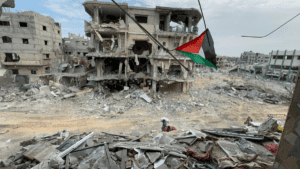In a significant development in the ongoing Israel-Hamas conflict, the Israeli military has announced that Israel Confirms Killing of Hamas Military Commander Mohammed Deif. This news marks a potential turning point in the war and could have far-reaching implications for both Hamas and the broader Middle East region.
The Life and Legacy of Mohammed Deif
Israel’s army declared that Mohammed Deif, Hamas’s top military commander, was killed in an Israeli air raid in southern Gaza on 13 July. The Israeli military stated unequivocally, “We can now confirm: Mohammed Deif was eliminated,” ending months of speculation about the fate of one of Israel’s most wanted figures.
Mohammed Deif, 58, was a key figure in Hamas, having been one of the founders of the Qassam Brigades in the 1990s and leading the force for more than two decades. Born as Mohammad Masri in 1965 in the Khan Younis refugee camp, he adopted the nom de guerre Mohammed Deif after joining Hamas during the first Intifada, which began in 1987.
Deif’s significance to Hamas and his notoriety in Israel cannot be overstated. He was responsible for developing the group’s network of tunnels and its bomb-making expertise, which made him a top target for Israeli forces for decades. His ability to evade capture and survive multiple assassination attempts – reportedly seven in total, with the most recent in 2021 – had earned him respect and fame among many Palestinians.
The Israeli military regarded Deif as part of a three-man military council that planned the October 7 attacks on southern Israel, which killed 1,139 people and saw more than 200 taken captive. In an audio tape broadcast on the same day, Deif named the raid “Al-Aqsa Flood,” framing it as retaliation for Israeli raids at Jerusalem’s Al-Aqsa Mosque, Islam’s third holiest site.
The Assassination
The attack that reportedly killed Deif occurred in al-Mawasi, an Israeli-designated “safe zone” west of Khan Younis. The strike, which targeted tents housing displaced Palestinians and a water distillation unit, resulted in at least 90 deaths and 300 injuries. The Israeli military claimed it acted on “precise intelligence” to hit an area where “two senior Hamas terrorists” and additional fighters were hiding among civilians.

Reactions and Implications
Israeli Defense Minister Yoav Gallant hailed Deif’s death as “a significant milestone in the process of dismantling Hamas as a military and governing authority in Gaza.” He referred to Deif as “the Osama Bin Laden of Gaza,” underscoring the commander’s perceived threat level. Other Israeli officials, including Finance Minister Bezalel Smotrich and opposition leaders, also welcomed the news, seeing it as a step towards victory against Hamas.
However, Hamas has not immediately confirmed or denied the claim. Izzat al-Rashq, a Hamas member, stated that the news of Deif’s killing was unconfirmed, adding that “Confirming or denying the martyrdom of any of the Qassam leaders is a matter for the leadership of the Qassam Brigades and the leadership of the movement.”
The announcement of Deif’s death comes at a time of heightened tension in the region. It follows closely on the heels of the assassination of Hamas’s political leader, Ismail Haniyeh, in Tehran. These back-to-back losses of senior leadership figures, if confirmed, would represent a significant blow to Hamas’s operational capabilities and morale.
Humanitarian Concerns
The human cost of the ongoing conflict remains staggering. According to Gaza’s Ministry of Health, at least 39,480 people have been killed and 91,128 wounded in Israel’s war on Gaza since October 7. The international community has expressed growing concern over the humanitarian crisis in Gaza, with calls for an immediate ceasefire intensifying.
The killing of Deif, if confirmed, also raises questions about the future leadership structure of Hamas and its military wing. With key figures potentially eliminated, the group may face challenges in maintaining its operational effectiveness and strategic direction. It remains to be seen how Hamas will adapt to these losses and what impact this will have on the ongoing conflict and any potential peace negotiations.
The international legal dimension of the conflict has also come into focus. In May, the International Criminal Court’s prosecutor requested arrest warrants for Deif, along with other Hamas leaders and Israeli officials including Prime Minister Benjamin Netanyahu, for alleged war crimes committed during and after the October 7 attacks.
As the region grapples with the implications of Israel’s claim about Deif’s death, there are concerns about potential escalation. Hamas and its allies may seek to retaliate, potentially leading to an intensification of violence. At the same time, Israel may see this as an opportunity to press its military advantage, potentially prolonging the conflict.
The announcement that “Israel Confirms Killing of Hamas Military Commander Mohammed Deif” marks a significant moment in the Israel-Hamas conflict. While Israel sees this as a major victory in its campaign against Hamas, the broader implications for regional stability and the prospects for peace remain uncertain. As the situation continues to evolve, the need for a diplomatic solution to end the cycle of violence becomes ever more pressing.
Related NewsHamas Chief Ismail Haniyeh Assassinated in Tehran
For more updates please checkhttps://x.com/Palestine_UN
















